What is your area of expertise and what is your research focus?
I have a degree in marine geology & geophysics. My main research area is a pedagogical one, exploring how technology can enhance student learning in introductory-level geoscience courses. I also am engaged in science communication and outreach activities through quilting science stories, and I blog for the American Geophysical Union at GeoEd Trek.
How did you end up in STEM?
I didn't have any interest in science or even consider becoming a scientist until my junior year of high school. I had an amazing chemistry teacher who had a one-on-one conversation with me that told me I was good at chemistry, that I would be successful as a future chemist, and that nothing could hold me back from achieving my goals. I went to college knowing I wanted to major in a science field, and after my first geology course, I knew that was the major for me. I also had a strong interest in the ocean, and my graduate studies allowed me to connect my interests in geology and oceanography.
What hurdles or challenges (big or small) did you find as you pursued your career in STEM? What challenges do you face today?
I recall back in high school, I and other students visited a company during career day. One of the male engineers looked at the girls in the group and told us not to join any of the "women in engineering" organizations in college, as we would be viewed as troublemakers. It's a shame that I was told that -- and that I didn't join any women in STEM groups in college because of what he said. At the time, I didn't realize how important it would be to speak with other women, to learn from their experiences as they navigated their STEM pathways. Now, I'm thrilled to see so many active organizations for women in STEM, organizations that I am a part of such as 500 Women Scientists, the Earth Science Women's Network (ESWN), and the Association for Women Geoscientists (AWG). I still see challenges in that we have much more work to do to support all gender identities and expressions in areas ranging from field safety, to bias and intentional exclusion, to micro-aggressions and bullying. But I'm hopeful that all individuals, especially those that have influence and power, can come together and provide support for the geoscience community and put the structures and policies in place for what we want to see and need to have.
What or who was an inspiration or support for you?
Looking back, I think the very first person that turned me on to science (although I didn't realize it at the time) was my fifth-grade teacher. We did a class project on growing radish seeds, and I remember being fascinated with the results. But it wasn't until high school that I first considered the idea of myself becoming a scientist. Looking back, it reminds me of how powerful a positive experience and positive words can be to propel students to achieve.
Why is it important for women to be in STEM and specifically your field?
It's not just women that need to be in the geosciences and marine sciences. All voices and identities need to be part of the conversations, part of the work, and part of the dissemination. Our field becomes stronger when there are more voices and contributions from all individuals.
What can be done to recruit more women into STEM?
STEM does not have a recruitment problem -- there are many women now and have always been women working in STEM fields. The challenge is retaining women in STEM. This requires everyone to support as well as acknowledge the work and contributions of women.
What advice would you give to girls and young women going into STEM?
Realize that you do not have to give up your interests in other subject areas as you pursue your degree in science! Note there are fields such as science art, science journalism, and science policy that all need individuals talented and skilled in multiple fields. Don't be afraid to cross disciplinary boundaries and pursue opportunities in these important fields.

